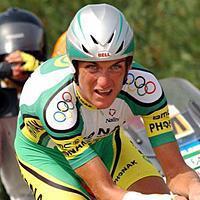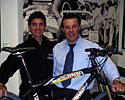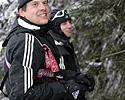First Edition Cycling News for November 22, 2005Edited by Anthony Tan & Les Clarke Wire in the blood: Hamilton's last hopeAs the riders in the European peloton turn their focus away from racing and think about their winter vacations, fired Phonak rider Tyler Hamilton will be eagerly awaiting the outcome of his September appeal to the Court of Arbitration for Sport in Lausanne, Switzerland. If his guilty verdict and subsequent two-year suspension are to be overturned, the sporting world's highest - and final - authority is his last hope. Anthony Tan spoke to two of the sport's foremost scientific and medical experts to examine the factors that will determine Hamilton's chances in the final hearing at the Court of Arbitration for Sport, now scheduled for January 10, 2006 in Denver, Colorado. Part I below examines the factors in play leading up to the Athens Games, where evidence of blood doping was first found. Tyler Hamilton was first publicly accused of blood doping during the 2004 Vuelta a Espaņa, where it was revealed he failed 'A sample' tests for homologous blood transfusion (mixed cell population) at the Athens Olympics and on September 13 at the Vuelta. However, leaked evidence now reveals suspicions of blood doping dating as far back as April 25, 2004, the day of Ličge-Bastogne-Ličge. So that is where we will begin. The day before Hamilton was set to defend his crown at Ličge, Hamilton's 'off-score' [see seperate story: 'Anti-doping measures get tougher'] measured 123.8. Normal values should be somewhere between 85 and 95, with the cut-off at 133. The then 33 year-old finished a credible ninth in the race, 12 seconds behind Italy's Davide Rebellin. On April 27, a few days later at start of the Tour de Romandie - a race where he successfully defended his title - it was up to 132.9, with a corresponding haematocrit level of 49.7 percent (the cut-off being 50). The off-scoreAlso known as the Stimulation Index (SI), the off-score is now by far the most important parameter used by anti-doping authorities in the sport of cycling. Here's why. The off-score is derived by taking into account both mean (or average) levels of haemoglobin (an oxygen-carrying protein carried in red cells, the average somewhere between 14 and 18 grams per 100 ml or g/dL) and reticulocytes (percentage of new or immature blood cells, the normal range between 0.5 and 2 percent). A simple formula that combines these two readings provides the off-score; whether you are an athlete or not, the values should be within this 85-95 range. Robin Parisotto, principal scientist involved in the development of the EPO blood test implemented at the Sydney 2000 Games and the former manager and senior scientist at the Australian Institute of Sport's (AIS) haematology and biochemistry laboratory, said of Hamilton's test results taken at the 2004 Tour de Romandie: "The off-score of 132.9 registered by Hamilton in April 2004 represented one which had a greater than 1 in 10,000 probability that it was a chance finding." Click here to read the rest of the story. "No-win situation" for San Fran GPFollowing on from the announcement that the 2006 San Francisco Grand Prix will be cancelled due to ongoing conflict with the city relating to unpaid bills, race director David Chauner described the current environment as a "no-win situation". "Despite the overwhelming popularity of the San Francisco Grand Prix, we have had to evaluate its financial viability in terms of the market conditions, potential for revenue and cost of running a world class race in order to determine if it makes sense to continue let alone ever turn a profit. Sadly its a no-win situation and we simply cannot go forward. Few companies will sponsor a politically-charged event." The city's Board of Supervisors said San Francisco Cycling LLC should not have not have been issued a permit for the 2006 event, originally scheduled for September 10, when policing bills totalling $89,924 were still yet to be paid from this year's race. San Francisco Cycling and the office of Mayor Gavin Newsom have argued they were only mailed the amount outstanding from the city's Department of Public Works a day before their meeting with the board. Said operations director Jerry Casale: "We were faxed the final and adjusted SFPD bill for $89,924 for the first time on November 10, 2005, just one working day prior to that meeting, all other city charges had been paid before we got our ISCOTT permit for the 2005 race, it wouldn't have been issued otherwise. And then they said we were late and purposely avoiding payment. That's simply not true." "That [the event] is being flushed down the toilet so some politicians can make a political point," spokesman for the Mayor, Peter Ragone said to the San Francisco Chronicle. However, supervisor Aaron Peskin said the event has been cancelled due to San Francisco Cycling's inability to pay monies owing to the city, colourfully describing the race organiser as "a bad actor that has repeatedly refused to pay its bills, or pay them on time." Peskin added that "San Francisco will be just as well off" with the Tour of California set to make its debut next year from February 19-26, 2006. "The most outspoken supervisor calls this 'corporate welfare' and ignores the value the event brings to the city and to the many restaurants, hotels and businesses that benefit from race-related events," said Chauner. Related stories: November 21 - San
Francisco GP cancelled Battered but unbowed, Bui hits the comeback trailBy Tim Maloney, European Editor
After a superb season where he won the Houffalize World Cup cross country race and finished third in the European championships, mountain biker Marco Bui finished 11th in the elite men's cross country race at the world championships in Livigno, Italy. But disaster suddenly struck Bui that day as he ran into a car when it unexpectedly turned in front of him; the 28 year-old went under the Toyota Yaris, which literally crushed both his legs. "I only remember a big impact", Bui explained to La Gazzetta dello Sport's Gigi Perna. "Then I was on the ground with my massacred legs... the doctors told me I blanked out all the rest." Bui suffered an open fracture of his right femur, tibia and fibula, crushed his left knee and foot and ruptured his spleen, which was removed. He needed almost 50 units of whole blood in the first 24 hours after the accident while in the hospital at Bassano del Grappa, where three teams of surgeons worked almost 18 hours straight to save Bui's leg. "It was really hard when I woke up after the first operation. They were really great in the hospital, but at my age it's hard to accept what happened... sometimes I was afraid because I thought they might still have to amputate my leg, even though the doctors told me I was out of danger." Bui received plenty of support while recuperating in hospital from friends, team-mates and above all, former Giro d'Italia winner Giovanni Battaglin, who owns the Full Dynamix team. Battaglin told Cyclingnews that "Marco is determined to come back and if anyone can do it, I know he can." Bui will need all the encouragement and support he can get, as the road back to cycling will be a tremendous physical and mental challenge. Bui has already had several operations to repair his broken legs and has more ahead of him in the next few months before he can begin his physical therapy, which could last as long as one year. "I know I'll probably need a year before I can get back on my bike, but I won't quit. I want to ride again," Bui explained. "Others like Marco Pantani and Herman Meier have come back even if they weren't as badly hurt as I am. The worst thing is that this came after my best season, where I won at Houffalize. Sometimes I try to move my legs and I dream of coming back like I was before." Surgery for Voigt; swift return expectedExamined on Monday after straining three ligaments in his right shoulder, Jens Voigt will now need to undergo surgery this (Tuesday) afternoon at the Martin Luther Clinic in Berlin, but the CSC rider has been told his preparation for next season will not be affected. The 34 year-old German injured himself while warming up for a cyclo-cross race in his hometown of Dassow last Sunday. "I can't avoid the surgery, but the doctors told me it's not that complicated, so in less than a week I can start using my home trainer," Voigt said on team-csc.com. "I can't remember the last time I was injured, so obviously it's frustrating to have to change my schedule a bit, but on the other hand I'm just happy it's nothing serious, and that it won't affect my preparations for next season." Team building for T-Mobile
The 2006 season has already kicked-off for the T-Mobile team, with riders gathering together for the first time in Munich and Vienna. A team building session in Montafon/Austria gave the team a chance to tackle a few challenges in the Alps to develop team cohesion, along with two days of ergometric testing, meetings and a photoshoot in Munich for team captain Jan Ullrich and his 28 team-mates. The team then travelled into the Alps for a two and half day team building session. Applying new methods to enhance communication, trust and the sharing of responsibility within the team, riders got to work in the mountains, with a strong focus on integrating the 12 new riders into the team fold. The motto for the session was "Action, reflection, transfer", with riders trekking up to the Lindauer cabin (1744 metres) through heavy snowfall, sharing a communal cooking session and constructing a ropeway to cross a canyon in freezing temperatures. "We went into a lot of these challenges, thinking we would never manage it!" said Ullrich. "But everybody weighed in so that we devised the right strategy to achieve our goals. It was very motivating and is bound to help us in the coming season." New recruit Linus Gerdemann agreed: "Of course, we were already fully aware of the importance of teamwork. However, the exercises in the Alps brought home the importance of staying calm and communicating with each other in critical and hectic situations." PhotographyFor a thumbnail gallery of these images, click here Images by T-Mobile
Strong fields for Oceania road and track championshipsNext week's Lion Foundation Oceania road and track championships in Wanganui, New Zealand, will be the largest ever, according to former national coach and organiser Ron Cheatley. Cheatley, who has been involved in cycling on a national and international level for many years, says that having six countries and over 220 riders at an Oceania road and track championships is much larger than normal. Riders from New Zealand, Australia, Guam. Fiji, New Caledonia and Tahiti/French Polynesia will be represented. Included in the Australian team are double Olympic medallist Anna Meares, former world championship medallist Rochelle Gilmore, and dual Olympic medallist Ryan Bayley. Former world champion Kathy Watt is also competing. Of the New Caledonian riders, young French sprint cycling star Herve Gane is the most notable, and according to French-based BikeNZ road coach Jacques Landry is definitely one to watch. According to Landry "He's fast! He will certainly test some of the local sprint riders and provide good competition in the events he races in." New Zealand's team of 35 road and track cyclists includes national road champions Gordon McCauley and Sarah Ulmer, national men's time trial champion Robin Reid, U23 world championship time trial bronze medalist Pete Latham and two members of the current Junior World Champion team's pursuit team. As well as those selected to represent New Zealand, also competing will be the best available riders from within the ten cycling New Zealand centres, ensuring that strong fields will be present for all events. The Oceania track championship events are being held November 30 - December 2 and the road championships on December 3-4. Holiday weekend Verge MAC and MABRA doubleheaderOne of the highlights of this weekend's cyclocross racing in North America will be the Capital Cross Classic in Reston, Virginia on November 27. Part of the $30,000 Verge Mid Atlantic Cyclocross Series (MAC), Sunday's race will be the last chance for racers in the Mid-Atlantic region to score all-important UCI points before the USCF national championships. Verge MAC Media Director Ken Getchell believes it should be a wide-open race: "The riders who have been dominating this year's UCI races - Trebon, Wicks, Wells and so on - are not coming to Washington. That makes this race absolutely crucial for racers chasing UCI points. Because they can score the big points, instead of fighting for a few table scraps mid-field, any east-coast UCI racer that doesn't show up for this race is just giving points away." The Mid Atlantic Bicycle Racing Association (MABRA) will host the first half of the weekend's doubleheader with the Tacchino Ciclicross on Saturday, November 26. The Tacchino Ciclicross, (Italian for "Turkey Cyclocross"), is being presented by Squadra Coppi - a cycling club based in Arlington, Virginia that is named after Italian cycling legend Fausto Coppi. As round seven in the eight-race series, the Tacchino Ciclicross will be the last opportunity for racers to score MABRA points before the climactic MABRA Championship race in December. For more information on the Capital 'Cross Classic, see the race's official website, www.emiracn.com; for the Tacchino Ciclicross, see www.squadracoppi.com. Paul Crake steps up to the challengeStair-climb champion turned professional cyclist Paul Crake reverted back to his previous ways last Sunday, winning the inaugural stair-climb race up the world's tallest skyscraper in Taipei. In a field of 75 international competitors, 28 year-old Crake, who rides for Austrian-registered team Corratec-Graz-Cyl, recorded the fastest time in the men's group division up the 508 metre-tall Taipei 101 building, climbing 91 floors (2,046 steps) in 10 minutes and 29 seconds and earning 200,000 Taiwanese dollars (US$5,965) for his efforts. Crake is also a five-time winner of New York's Empire State Building stair-climb race (1999-2003). The man who beat him this year, Austrian Rudolf Reitherger, finished second at Sunday's event in Tapei, 1 minute and 17 seconds behind Crake. Another Austrian, 26 year-old Andrea Mayr, won the women's race in a time of 12 minutes and 38 seconds, 56 seconds ahead of second-placed Melissa Moon from New Zealand. Garzelli starts a familyThe first son of Stefano and Maria Garzelli was born yesterday at 2pm in Valencia, Spain. Little Marco Garzelli weighs 3.4 kg, with both mother and child reported to be in good health. "That was such an unbelievable emotion," said Garzelli. "I'm going to stay with my family in the following weeks to realise what it means to be a father." With father-son acts such as Eddy and Axel Merckx, the question on most cycling fans' lips is whether Marco will follow in his father's footsteps. Garzelli had this covered, saying: "I know it's obviously a bit soon, but I'm looking forward to going for a ride with him."
Previous News Next News (All rights reserved/Copyright Knapp Communications Pty Limited 2005) |

|
January 2009 |
Recently on Cyclingnews.com |



